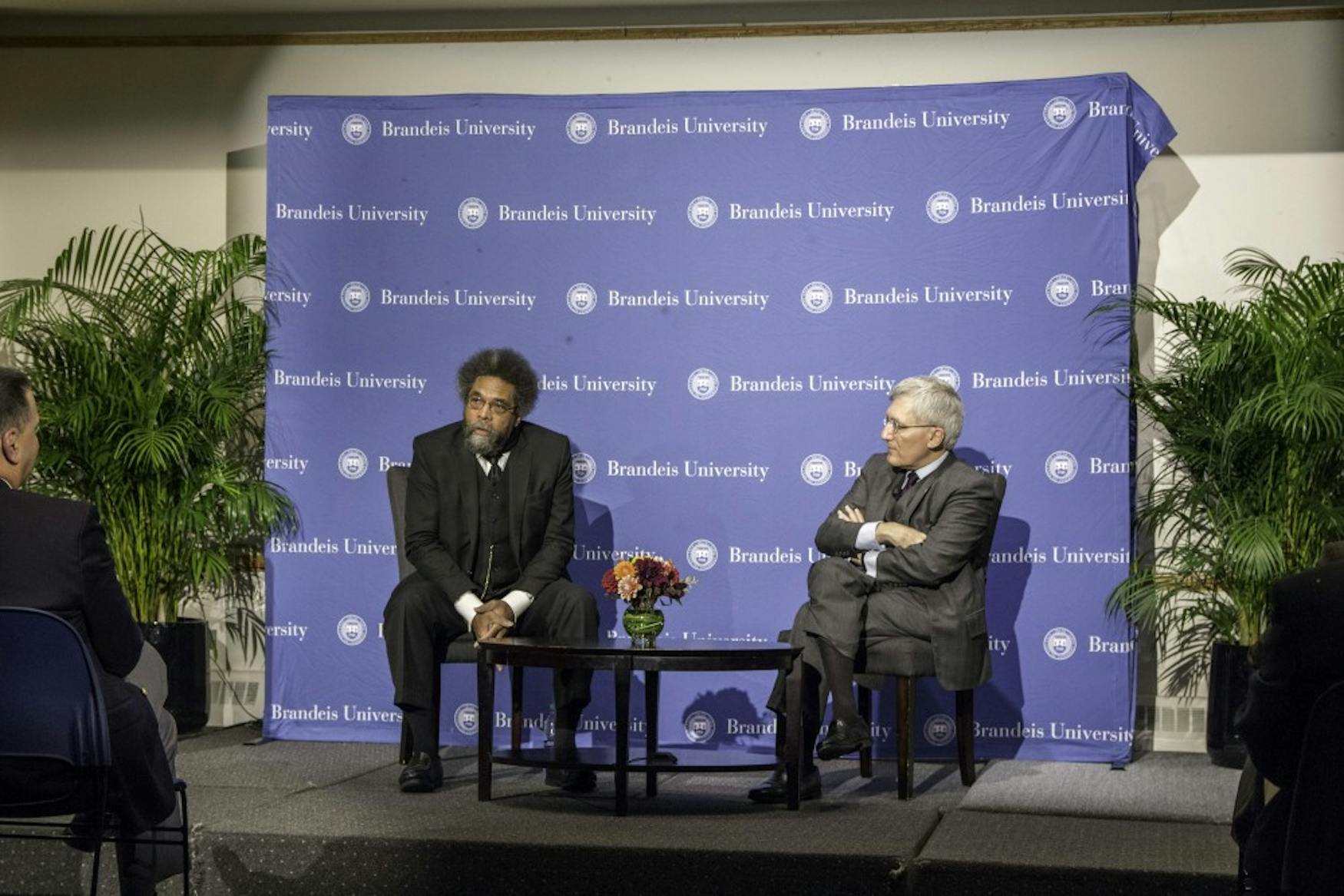Cornel West, Robert George discuss value of liberal arts
Cornel West and Robert George met in the Sherman Function Hall on Wednesday evening to discuss the importance of a liberal arts education in modern political discourse.
University President Ron Liebowitz described both men as “public intellectuals.” West is a self-described “radical democrat,” while George is known for his conservative attitudes toward abortion and LGBTQ rights. West is the professor of the Practice of Public Philosophy at Harvard Divinity School and has written 20 books, according to his personal website. Robert P. George is a McCormick professor of Jurisprudence and has written four books, according to his Princeton University bio.
The event, titled “Liberal Learning: Open Minds and Open Debate,” was primarily sponsored by the American Studies program, with additional support from seven other campus groups, including the Schuster Center for Investigative Journalism and the International Center for Ethics, Justice and Public Life. American Studies Chair Maura Farrelly introduced the event, highlighting the generous contributions of Sam Weissman ’73 and Kent Lawrence ’66 that made the event possible.
The two scholars were united in their assessment of the value of a liberal arts education, but each described its importance in different ways. Both agreed, though, that a rigorous liberal arts education is liberating, whether from economic uncertainty for George or from fraught questions about race and justice in the United States for West. George described his philosophical and personal reasons for valuing the liberal arts, while West focused on the social and political importance of a liberal arts education.
George described how his upbringing in a poor home in rural West Virginia made him value education. Both of his grandfathers were coal miners, and “education promised socioeconomic advancement” to his family.
George’s first encounter with the liberal arts occurred at Swarthmore College, where he took a “kind of Plato-to-NATO” course in political theory. There, he grappled with classical philosophers’ ideas and began to question his everyday assumptions. “[Plato] forced me to think about why I believed what I believed,” he said.
George said that in recent years, colleges and universities have lost sight of the true value of skepticism. The widespread failure to recognize this value, he said, is evidence that “we are losing our sense of the real value of liberal arts education.” Currently, people defend the liberal arts by arguing that it teaches students valuable critical thinking skills they can’t develop anywhere else. While George agrees with this view, for him, the real value of a liberal arts education is its capacity to cultivate a lifelong desire to pursue the truth.
Both George and West agreed that a true liberal arts education should expose students to ideas and perspectives they may find offensive. “The whole point of our being here with you is to unsettle you,” George said.
George added that a liberal arts education instills students with “intellectual humility” by serving as a constant reminder of their own fallibility. When we become convinced that our beliefs are correct, he said, we tend to wrap our convictions up in our emotions, and that attachment breeds closed-mindedness and dogmatism. Having a sense of “intellectual humility” forces us to constantly question our beliefs, and it keeps us from getting too complacent with what we know and how we know it.
Cornel West quoted Herbert Marcuse, a philosopher and political theorist who taught at Brandeis from 1958 to 1965, on his view of free speech: “Talk about truth all you want, a condition of truth is to allow suffering to speak.” West explained passionately that he believes a good liberal arts education is intimately tied to the ideals of democracy and the free, unrepressed exchange of ideas. “Most of our history has been a history of hatred, of contempt, of domination, of exploitation,” he said. “Democracies are simply these disruptions trying to create spaces in which maybe you can arrest the hatred, arrest the contempt, arrest the domination, arrest the exploitation.”
Although the event was advertised as a conversation between West and George, only about 15 minutes of the 90 minute event were dedicated to points of disagreement. The duo spoke about the ways in which they disagree on the role of free-market capitalism in modern society. West talked about his time working with the Democratic Socialists of America, and George professed his belief in the free market. They then responded to questions from the two audience members.
Roland Blanding ’21 directed his question to Cornel West specifically. Blanding said that in West’s book “Race Matters,” West identified three types of Black leaders: race-identifying protest leaders, race-effacing managerial leaders and race-transcending prophetic leaders. Blanding asked West which type of leader he considers himself, and asked West, “What can I do to become a transcendent leader, not just a transcendent Black leader?” West replied that he considers himself a “lone ranger” rather than a leader, because leaders are tied to specific organizations, and he is not. He observed that great people who aren’t tied to organizations “don’t allow their popularity to trump their integrity.” West did not directly answer Blanding’s second question.
Another student used their question to express skepticism at the claim that civility and humanity should outrank efforts to make change. “As a millennial, I live in a world that is teetering on the brink of fascism,” they said. “It seems very unfair to ask the people at the bottom to be very civil to the [people who are] oppressing them.”
West responded that respecting other people is not the same thing as civility. He added that oppressed people are in the best position to extend respect to everyone in their lives. “We are asking all persons, especially those who have been dehumanized, to stay in contact with the humanity of others because they know precisely what it’s like to experience dehumanization.”



Please note All comments are eligible for publication in The Justice.